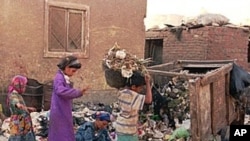With Islamist groups expected to do well in Egypt's parliamentary elections, many Coptic Christians are concerned that their limited rights will come under greater threat.
The trash of millions of people collects in Cairo's Garbage City, the narrow lanes filled with plastic, metal, wood - anything the district residents can resell to eke out a living.
The slum, on the outskirts of the capital, is home to a large Coptic Christian community. Many are trash collectors, or zabaleen. And above the squalor is a testament to their faith - the largest Christian church in the Middle East, cut into the hillside that begins the plateau east of Cairo.
For Christians, Egypt is the land revered for sheltering a young Jesus and his family. But it has long been the province of an Islamic majority, a fact that some Coptic Christians say Muslims are quick to point out.
Said, who gives only his first name, says Christians are discriminated against.
He says Coptic Christians do not have the same rights as other people in the country, and that others look down on them as if they are not human. Said says discrimination was institutionalized under the old government, with restrictions on church construction and the ability to change one's faith. The current military government has proved no better, he says, cracking down on a Coptic protest march last month, in a violent night that left 25 people dead.
Now, some Christians say, it can only get worse. The elections that started this week are expected to favor Islamist parties, including the conservative Salafis.
Medhat Sa'ad, a resident of Garbage City, fears that if Salafis are in charge, a woman walking on the streets without a veil "could be slaughtered."
Although Salafi-inspired violence has dominated newspaper headlines in recent months, some experts say widespread fear is not justified.
"I know a lot of people, even very practicing Muslims, who take their faith very seriously, who do not want to see this kind of interpretation of Islam being overrepresented in parliament. I would say, in general, most Egyptians are more leaning to the more moderate interpretation of Islam or moderate involvement of Islam in political life," political analyst Rania el-Malki says.
Even if extremist views prevail, some Coptic Christians in Garbage City say they will never leave.
Adel Gad el-Rab is a former garbage collector who says God protects everyone in Egypt. When reminded that the country's once thriving Jewish community is all but gone, he declares he will never leave until, as he puts it, he goes to "his homeland in heaven."
El-Rab says the people here are the poorest in Cairo. "We are the garbage collectors," he says, "but we live on a mountain of faith."















